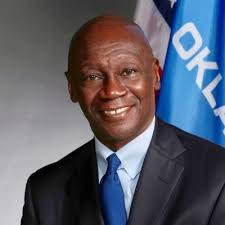Interim Studies Examining Racial Justice and Discrimination Issues Held
Mike Seals - September 23, 2020 10:17 pm

OKLAHOMA CITY – On the heels of mounting racial tension brewing across the United States, Sen. George Young, D-Oklahoma City, hosted two interim studies on Tuesday that examined the benefits of forming a state commission on race and equality and requiring racial impact statements for new legislation that would impact the criminal justice system.
“We’ve been searching for answers to what’s happened in our nation over the past few months, and I believe some of these issues can be solved with legislation,” Young said. “Creating a race and equality commission would bring community voices together to offer suggestions and recommendations to address the racial and socioeconomic disparities we see across our state. Now is the time to be proactive rather than reactive.”
Oklahoma City Councilwoman Nikki Nice spoke to the legislative panel and shared that of the largest 100 cities in the United States, 67 have a board or commission that investigates and enforces human rights for citizens. These groups may collect information, assess local policy, educate local and state agencies and officials, and investigate human rights complaints.
Oklahoma City is only one of 33 cities in the top 100 without such a commission or board. She explained the city council is in the beginning stages of creating such a group, but a state-led entity is needed to help lead community groups and provide accountability.
Oklahoma Policy Institute Criminal Justice Policy Analyst Damion Shade also addressed the group, sharing that the socioeconomic disparities seen in the state are not solely based on race, but are also divided in a rural vs. urban gap.
A lack of mental health resources in Oklahoma’s small towns has led to a 111 percent increase in pre-trial jail populations in rural areas. Further, he explained that the top 10 counties reporting the highest drug death rates and the top 10 counties with mental health distress calls are both rural, a disparity that’s often overlooked by legislation and could be fixed with an independent commission studying this data.
“This is not an issue that is only race related,” Young said. “The disparities we see in Oklahoma are broad, and we need a commission that looks at the welfare of the most vulnerable citizens of this great state.”
The second interim study hosted by Young focused on the need for racial impact statements when crafting criminal justice legislation, which would study how creating or changing offenses, or changing existing sentencing, parole or probation procedures would impact communities of color.
“In Oklahoma, it costs anywhere from $12,000 to $25,000 to incarcerate one inmate per year, maybe more if the inmate has health issues,” Young said. “African Americans make up eight to nine percent of our state’s population, but this same group makes up 25-30 percent of our total incarceration rate. Mass incarceration exasperates inequality and we must address this issue.”
Richard Smotherman, the Oklahoma State Bureau of Investigation (OSBI) legislative liaison, said the agency currently doesn’t have a great way to analyze the racial impact of proposed legislation. Law enforcement agencies are required to report crime data to the OSBI on a monthly basis, he explained, but they’re only required to report on certain crimes.
“I believe racial impact statements are absolutely needed before we proceed with any legislation that would create changes to our criminal justice system,” Young said. “Knowledge and data are power. These statements would be no different than a fiscal impact statement for measures that deal with state appropriations, and it wouldn’t be binding for legislation to move through the process. However, more information on how we could be disproportionately affecting communities of color unintentionally with our actions is very important.”
Measures for the 2021 legislative session, which will begin on Feb. 1, can begin to be filed on Nov. 15.
For more information, contact: Sen. George Young at 405-521-5531, or email [email protected].



